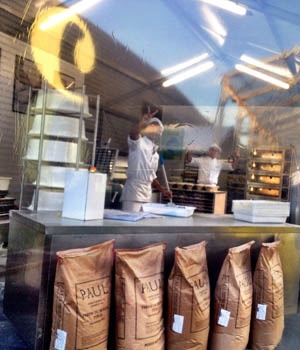
Feeding the 40 000 picky palates at this year’s global climate change summit – in a sustainable manner – was always going to be a challenge.
But organisers at COP21 saw the conference as the ideal vehicle to showcase the gastronomic skills of French gourmet cuisine. With a distinctly environmental flavour, of course. The challenge was to create responsible meals for all tastes at the conference, or “low-budget bistronomique” meals, along with self-service restos and snack bars.
One of France’s most famous and popular boulangerie, Paul, is a favourite at the conference. But the organisers also wanted to give visitors a glimpse of what goes on in a French kitchen, baking bread every day.
One of the first sights visible to delegates at the climate talks is a see-through bakery, where Paul’s finest pastry chefs knead bread and create croissants. Bags of flour litter the floor, while delicious smells emerge from the hot ovens.
The fresh bread is baked on the spot with Normandy flour. More than 10 000 loaves of French bread are kneaded, shaped and baked at the unique see-through kitchen every day.
Paul is a family-owned French chain of bakery-cafés established in 1889 in Croix, northern France, and is now represented in 41 countries. And South Africans will also have the chance to sample its fare after a South African company signed a deal with the French chain boulangerie to open a few restaurants.
Paul’s baguettes are certainly proving to be a hit among the COP21 delegates, with even ministers queuing up for a fresh baguette sandwich, but the conference centre also offers a typical French fine dining restaurant.
The official caterer, the Elior Group – well-known for the Les Ombres, le Ciel de Paris and La Maison de l’Amérique Latine restaurants – has gone to great lengths to draw up a perfect menu
At the“bistronomique” Etoile restaurant, delegates can indulge in a specially created menu. Chef Sebastien Millier and 12 other top chefs from the group’s finest catering establishments crafted a gourmet menu every day.
“Our mission is to showcase and promote French gourmet cuisine to all of our customers from around the world,” said Millier.
Millier was in charge of creating all of the COP21 menus, coordinating the “daily specials” drawn up by the Group’s 12 top chefs.
“We defined our recipes and catering offerings by selecting the best produce from local suppliers,” he said.
“Serving up to 20 000 meals a day is a real challenge at the operational level. We test all the dishes we create for the conference to ensure that it is a culinary success, always in the hope that we will be able to arouse the senses of all those dining in our restaurant.”
Most of the food is produced locally, not only for the freshness and high quality but also to keep the carbon footprint of the produce as low as possible. Of the food served at COP21, 74% is made in France and the bulk of produce is grown in the Paris region. The meat and fish hail from France too.
All coffee at the talks is 100% “bio or fair-trade” produced.
The caterers firmly believe that choosing quality produce not only ensures that consumers can enjoy
tasty and healthy meals, but is also the best way to avoid waste.
“The better it is, the less gets wasted,” said Vincent Fellman, Elior director of the Porte de Versailles and Paris Le Bourget exhibition centres.
All fish served at the conference is rated as sustainable and the Elior Group has chosen the “Bleu Blanc Coeur” label, an association that defends healthy nutrition for animals.
Leftover food waste was a major “after meal” challenge for the caterers. To avoid this, they partnered with an association that redistributes unsold meals to charitable associations in the Paris region.
“We believe our job does not end when the plate is empty but extends well beyond the dining experience,” Fellman said.
For the COP21 conference all waste generated by the catering venues is sorted into five separate containers for recycling organic waste, plastic and PET products, cans, glass and sundry waste
Fruit and Vegetable producer Transgourmet’ Jardins de Pays is one of the fruits and vegetable providers. Their products are grown by farmers in the Paris region in a way that respects biodiversity, and guarantee optimum product traceability.
Transgourment selects products using three fundamental criteria: the production sites must be located less than 200km from the platforms, all produce must be in season and, lastly, it must be cultivated in a responsible manner.




 Publications
Publications
 Partners
Partners








